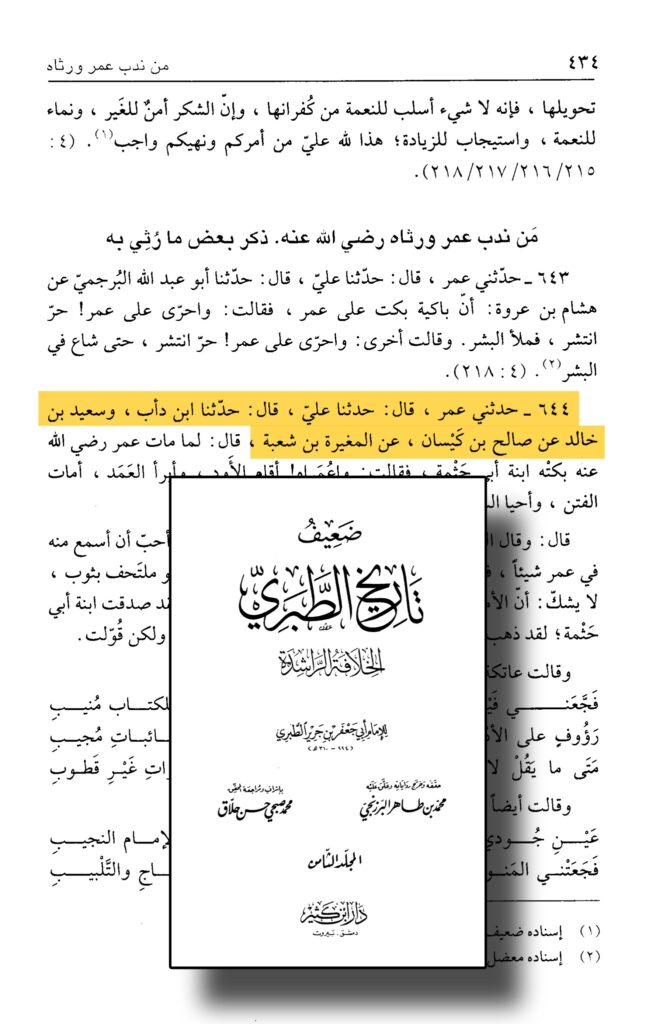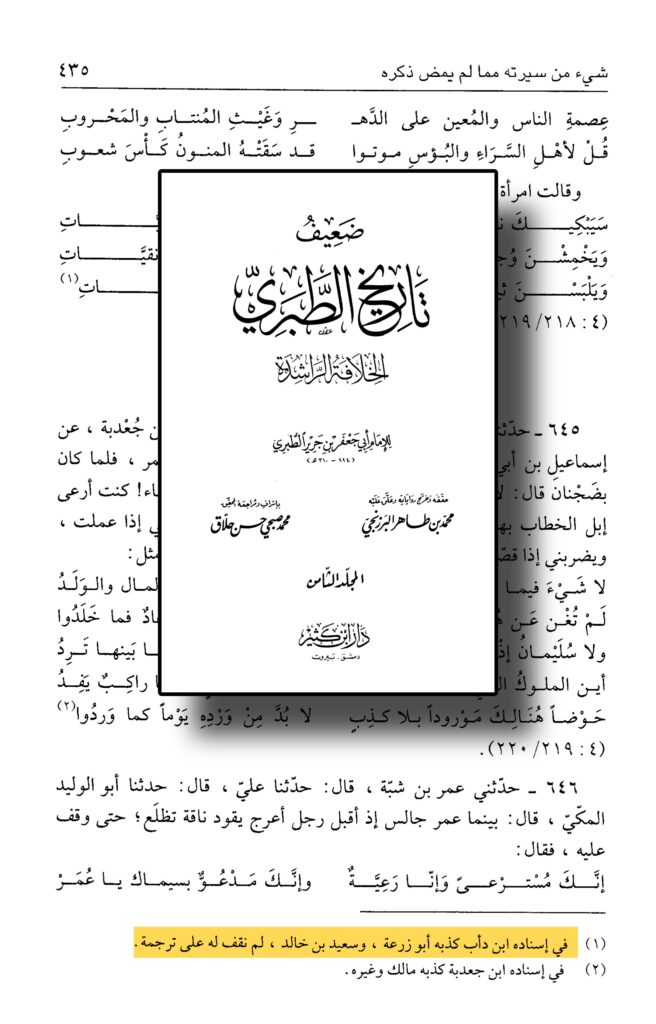Did Imam Ali (as) recite a eulogy praising Umar in Nahjul Baalagha?
Jul 27, 2025 | Concise
The Nawasib have argued as follows:
in this article we will be taking a look at a comment by Al-Shareef Al-Radhi that was omitted by the Shias, for it contained a name that brings discomfort to their hearts: Omar.
Sermon #226
Ali said, “May Allah reward such and such man who straightened the curve, cured the disease, abandoned mischief and established the sunnah. He departed (from this world) with untarnished clothes and little shortcomings. He achieved good (of this world) and remained safe from its evils. He offered Allah’s obedience and feared Him as He deserved. He went away and left the people in dividing ways wherein the misled cannot obtain guidance and the guided cannot attain certainty.”
Ibn Abi Al-Hadeed 3/383 says, “The man that is referred to is Omar bin Al-Khattab. It was found in Al-Radhi’s copy – the author of Nahjul Balagha – under ‘such and such man’ the name: Omar. I was told of this by Fakhaar bin Ma’d Al-Musawi Al-Awdi the poet. I also asked the head of Al-Ashraf (Bani Hashim) Abu Ja’afar Yahya bin Abi Zaid Al-Alawi and he said, ‘It is Omar.’ I said, ‘The commander of the believer – peace be onto him – would praise him in such a way?’ He said, ‘Yes’.”
To get a better perspective of who exactly is saying what, we briefly point out that Fakhaar bin Ma’d is a major seventh century scholar that studied under Ibn Idrees Al-Hilli and Ibn Shahr Ashoub. He is the teacher of notable scholars like Al-Muhaqiq Al-Hilli, Ahmad bin Tawus, and Ali bin Tawus. He was praised as a major scholar by the likes of Al-Hurr Al-Amili, Al-Majlisi, and Abbas Al-Qummi.
The second scholar that is mentioned is Yahya bin Mohammad bin Mohammad bin Abi Zaid Al-Alawi, and it is sufficient to know that he is the representative of Bani Hashim in Al-Basra in the seventh century.
First Point: The Shī‘a have been accused of deliberately removing the name of ʿUmar and replacing it with the term “so-and-so” (فُلَان).
Second Point: It is claimed that in this sermon, the term “so-and-so” (فُلَان) refers to ʿUmar, and that the statement contains praise.
Dear readers, let us carefully examine both of these matters.
First Point:
The question arises: Have only the Shī‘a narrated this phrase using the word “فُلَان”? Or have Ahl al-Sunnah scholars also transmitted it in this manner? Let us investigate.
-
Ibn al-Athīr (d. 606 AH), under the entry “عَمَدَ”, writes in his renowned lexicon al-Nihāyah fī Gharīb al-Ḥadīth:
وَمِنْهُ حَدِيثُ عَلِيٍّ: «لِلَّهِ بَلَاءُ فُلَانٍ، فَلَقَدْ قَوَّمَ الْأَوَدَ وَدَاوَى الْعَمَدَ»
Wa-minhu ḥadīthu ʿAlī: “Lillāhi balāʾu fulān, fa-laqad qawwama al-awad wa-dāwā al-ʿamad.”
“Among them is the narration from ʿAlī: ‘May Allah reward so-and-so (فُلَان) — for he straightened the crookedness and treated the fracture.’”
(al-Nihāyah, vol. 3, p. 297, Maktabah al-Islāmiyyah)
-
al-ʿAllāmah Ṭāhir al-Ghujrātī writes similarly in his lexicon:
وَمِنْهُ ح: «لِلَّهِ بَلَاءُ فُلَانٍ، فَلَقَدْ قَوَّمَ الْأَوَدَ وَدَاوَى…»
Wa-minhu ḥ: “Lillāhi balāʾu fulān, fa-laqad qawwama al-awad wa-dāwā…”
“In one narration: ‘May Allah reward so-and-so (فُلَان) — for he straightened the crookedness and treated [the ailment]…’”
(Majmaʿ Biḥār al-Anwār, vol. 3, p. 572, Hyderabad)
Dear readers, since the word فُلَان appears in these early narrations, it is clear that al-Sharīf al-Raḍī, the compiler of Nahj al-Balāghah, simply quoted the narration as he received it. There is no evidence of manipulation or dishonesty on his part. In fact, Sunni sources predate him in using the term فُلَان. If any objection is to be raised, it should first be directed toward those Sunni scholars who narrated it thus—before criticizing any Shī‘ī narrator or al-Sharīf al-Raḍī.
Second Point:
Let us now examine the second claim: Was this narration intended as praise of ʿUmar?
Dear readers, since the narration uses the ambiguous term فُلَان, scholars from various schools have offered different interpretations. And because no explicit name is mentioned, no definitive conclusion can be reached regarding the identity of the person intended.
As is well known in principles of reasoning:
“مَوْضِعُ الشُّبْهَةِ يُسْقِطُ الِاحْتِجَاجَ”
“Where there is doubt, the authority of evidence collapses.”
In any case, Shīʿa scholars have offered several interpretations of this narration:
-
The person intended is not ʿUmar, but rather one of the companions of Amīr al-Muʾminīn ʿAlī (ʿalayhi al-salām) who passed away before the trials after the Prophet’s death.
-
ʿUmar may be intended, but the statement is not from Amīr al-Muʾminīn (ʿalayhi al-salām); it is the statement of a woman.
-
(By way of argument, even if the claim is accepted): The statement may be rhetorical or simply quoting a view which Imam ʿAlī (ʿalayhi al-salām) does not affirm.
1. Views of Shīʿa Scholars
Among Shīʿa scholars, there exists ikhtilāf (disagreement) on who is intended by the term فُلَان. Let us explore this further by referring to the commentary of Ibn Abī al-Ḥadīd al-Muʿtazilī, whose views are often cited in this discussion, even though he was not a Shīʿī.
al-ʿAllāmah Sayyid Ibn Hibatullāh al-Rāwandī, one of the earliest commentators of Nahj al-Balāghah, writes:
وَرُوِيَ: «بَلَاءُ فُلَانٍ» أَيْ صَنِيعُهُ وَفِعْلُهُ الْحَسَنُ، مَدَحَ بَعْضَ أَصْحَابِهِ بِحُسْنِ السِّيرَةِ وَأَنَّهُ مَاتَ قَبْلَ الْفِتْنَةِ الَّتِي وَقَعَتْ بَعْدَ رَسُولِ اللَّهِ صَلَّى اللَّهُ عَلَيْهِ وَآلِهِ…
“It has been reported: ‘Balāʾu fulān’ — i.e., his good action and praiseworthy conduct. He [ʿAlī] praised some of his companions for their character, and that they died before the fitnah that occurred after the Messenger of Allah (ṣallallāhu ʿalayhi wa-Ālihi)…”
(Minhāj al-Barāʿah, vol. 2, p. 110, taḥqīq: ʿAzīzullāh al-ʿAṭṭāridī)
al-ʿAllāmah Ḥabībullāh al-Khūʾī says:
وَعَلَيْهِ فَلَا يَبْعُدُ أَنْ يَكُونَ مُرَادُهُ (عليه السلام) هُوَ مَالِكُ بْنُ الْحَارِثِ الْأَشْتَرِ.
“Thus, it is not far-fetched that the one intended by Amīr al-Muʾminīn (ʿalayhi al-salām) as ‘فُلَان’ was Mālik ibn al-Ḥārith al-Ashtar.”
(Minhāj al-Barāʿah, vol. 14, p. 374, al-Maktabah al-Islāmiyyah, Tehran)
Dear readers, the opinion of Ibn Abī al-Ḥadīd al-Muʿtazilī is often presented as if it reflects a Shīʿī stance. However, his Muʿtazilī identity is well-known, and agreement with the Shīʿa on some matters does not make one Shīʿī. In fact, he disagrees with them on many core theological points.
Let us now examine the evidence upon which Ibn Abī al-Ḥadīd based his conclusion that فُلَان = ʿUmar:
Claim: In a manuscript of Nahj al-Balāghah written in the handwriting of al-Sharīf al-Raḍī himself, the word ʿUmar is written beneath the word فُلَان.
Response: Let us quote Ibn Abī al-Ḥadīd directly:
وَقَدْ وَجَدْتُ النُّسْخَةَ الَّتِي بِخَطِّ الرَّضِيِّ أَبِي الْحَسَنِ جَامِعِ نَهْجِ الْبَلَاغَةِ، وَتَحْتَ «فُلَانٍ» «عُمَر»، حَدَّثَنِي بِذَلِكَ فَخَّارُ بْنُ مُعَدٍّ الْمُوسَوِيُّ الْأَوْدِيُّ الشَّاعِرُ.
“I found the copy in the handwriting of al-Raḍī Abī al-Ḥasan, compiler of Nahj al-Balāghah, and beneath ‘فُلَان’ was written ‘ʿUmar’ — this was narrated to me by Fakhar ibn Maʿadd al-Mūsawī, the poet.”
(Sharḥ Nahj al-Balāghah, vol. 11–12, p. 189)
Comment: This claim rests entirely on Fakhar al-Mūsawī, a poet. We must ask:
-
What is his credibility?
-
What is his chain of transmission to al-Raḍī?
-
Could the manuscript have been falsely attributed to al-Raḍī?
-
Was this a marginal note added by a later scribe?
None of these questions are answered, and therefore, this claim cannot be treated as reliable evidence.
Furthermore, Ibn Abī al-Ḥadīd reports:
وَسَأَلْتُ عَنْهُ النَّقِيبَ أَبَا جَعْفَرٍ يَحْيَى بْنَ أَبِي زَيْدٍ الْعَلَوِيَّ، فَقَالَ لِي: هُوَ عُمَرُ.
“I asked Naqīb Abū Jaʿfar Yaḥyā ibn Abī Zayd al-ʿAlawī about it, and he said to me: ‘It is ʿUmar.’”
This too is a personal opinion, not textual evidence. And since Abū Jaʿfar was Zaydī, his view is not binding on Imāmī Shīʿa scholarship.
Final Note:
Dear readers, we have examined the major arguments used to identify فُلَان as ʿUmar, and we find that none are conclusive or binding.
Second Angle: A Forgotten Detail
Even if we accept for argument’s sake that فُلَان refers to ʿUmar, we must note:
The speaker is not Amīr al-Muʾminīn (ʿalayhi al-salām). Rather, it is a woman.
Indeed, this statement appears in non-Shīʿī sources such as Tārīkh al-Ṭabarī, Tārīkh Dimashq, and others — and there, it is attributed to a woman at ʿUmar’s funeral, not to Imam ʿAlī (ʿalayhi al-salām). Some versions suggest Imam ʿAlī affirmed her words; others make no such claim at all.
Commentary:
Dear readers! First and foremost, it is questionable whether the manuscript under discussion was truly written by Sayyid al-Raḍī with his own blessed hand or not. This attribution is based solely on the statement of a poet, Fakhkhār al-Mūṣawī, who conveyed this information to Ibn Abī al-Ḥadīd. This raises the question: how reliable and trustworthy is the personality of Fakhkhār al-Mūṣawī? Does he possess such scholarly or traditional authority that his statement may be depended upon?
Furthermore, it is unclear how many and which intermediaries existed between Fakhkhār al-Mūṣawī and Sayyid al-Raḍī. Are all those intermediaries well-known and reliable, or is there weakness among them?
There is also the possibility that this manuscript originally belonged to someone else but was later attributed to Sayyid al-Raḍī. And even if the manuscript did indeed belong to Sayyid al-Raḍī, the possibility cannot be ruled out that later scribes or copyists may have inserted the name ʿUmar into it.
Therefore, keeping all these possibilities in mind, it is incorrect to draw any argument solely from the statement of Fakhkhār al-Mūṣawī.
Dear readers! At this point, Ibn Abī al-Ḥadīd further mentions that he asked Naqīb Abū Jaʿfar Yaḥyā ibn Abī Zayd al-ʿAlawī about the identity of “fulān” (so-and-so), and he replied: “It refers to ʿUmar.”
Here is the original passage:
وسألت عنه النقيب أبا جعفر يحيى بن أبي زيد العلوي، فقال لي: هو عمر.
“And I asked Naqīb Abū Jaʿfar Yaḥyā ibn Abī Zayd al-ʿAlawī about this, and he said: It is ʿUmar.”
(Sharḥ Nahj al-Balāgha by Ibn Abī al-Ḥadīd, vol. 11/12, p. 189, edited by Muḥammad Ibrāhīm)
Commentary:
Readers, this is the personal opinion of “Abū Jaʿfar,” and according to Shīʿī researchers, he belonged to the Zaydī sect. Hence, his view is his own ijtihād, which is not binding even upon his own sect, let alone upon the Imāmiyya.
Final Commentary:
Dear readers! We have now fully analysed the usual arguments presented in favour of attributing the statement to ʿUmar. Let us now examine it from a different perspective.
Secondly:
Even if we accept that ʿUmar was indeed the one referred to, this statement was not from Amīr al-Muʾminīn ʿalayhi al-salām, but rather from a woman.
Dear readers! In fact, this statement is reported in non-Imāmī sources, and it can be found in various Sunnī books such as Tārīkh al-Ṭabarī, Tārīkh Dimashq, and others. According to these reports, the words are not those of Amīr al-Muʾminīn ʿalayhi al-salām, but of a woman who came to the funeral of ʿUmar and said them. Some narrations report that Amīr al-Muʾminīn ʿalayhi al-salām affirmed her words, while others remain completely silent on the matter.
In some narrations from that same day, it is also reported that Amīr al-Muʾminīn ʿalayhi al-salām bathed, dressed neatly, wore appropriate clothes, and participated in the funeral. According to some reports, he even said about that woman: “This statement was not of her own, rather it was made to be said by her.”
Although there is room for detailed discussion on all these points, for the sake of brevity we will only present the analysis of the modern researcher Muḥammad ibn Ṭāhir al-Bazrjanjī. While examining the chain of this narration, he declared one narrator to be unknown (majhūl) and another to be a liar (kadhdhāb).
(Ḍaʿīf Tārīkh al-Ṭabarī, vol. 8, pp. 434–435)

Moreover, the very act of Amīr al-Muʾminīn ʿalayhi al-salām preparing himself, grooming his hair and beard, and attending the funeral in such a state—does this behaviour resemble that of a grieving individual, or does it reflect contentment or even happiness? Those of understanding can judge for themselves. In our view, appearing at a funeral in such a manner typically signifies relief or composure, not sorrow.
And this is further clarified by the original narration in Tārīkh al-Ṭabarī, where the woman’s words are attributed to the daughter of Abū Ḥithmah (or Khaythamah).
Thirdly:Even if this statement is accepted as referring to ʿUmar, it can be said that Amīr al-Muʾminīn ʿalayhi al-salām uttered it either out of surprise, or as a rhetorical question, or even sarcastically.
And the concluding sentence of the narration from Amīr al-Muʾminīn ʿalayhi al-salām indicates this:
“والله ما قالت ولكنّها قوّلت”
“By Allah! She did not say this on her own; rather, it was made to be said by her.”(Mukhtaṣar Tārīkh Dimashq, vol. 19, p. 49, Dār al-Fikr, Damascus, Syria)
So here, both possibilities remain: that it may have been a satanic suggestion or a divine (raḥmānī) inspiration. When both possibilities exist, the argument becomes weak and inconclusive. The Shīʿa maintain that this was a satanic suggestion, because ʿUmar introduced many innovations (bidʿah), and even openly attributed praise to the innovation of Tarāwīḥ, calling it “niʿma al-bidʿah” (what a good innovation!). Thus, it could never have been a divine inspiration.
In addition to this, Ṣaḥīḥ Muslim records that ʿUmar himself confessed that Amīr al-Muʾminīn ʿalayhi al-salām regarded both Abū Bakr and ʿUmar as liars, sinners, oath-breakers, and traitors.
(Ṣaḥīḥ Muslim, vol. 5, p. 32, ḥadīth no. 4577)
May Allah grant perfect guidance to the opponents. Āmīn.
Written by: Sayyid Khayr Ṭalab Zaydī (ḥafiẓahullāh) and updated by the Shiapen Team
Compiled by: ʿAbd Allāh Imāmī


